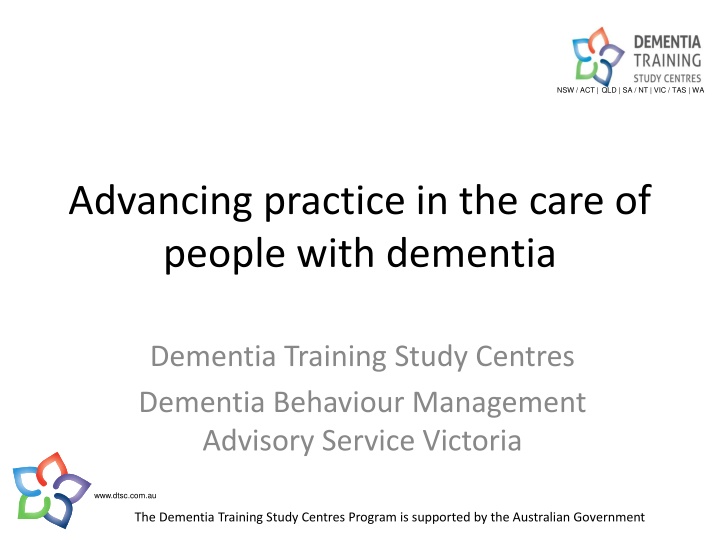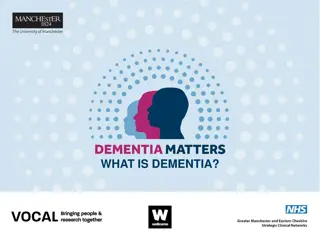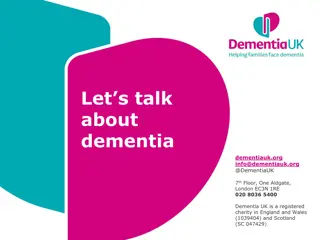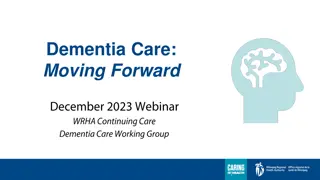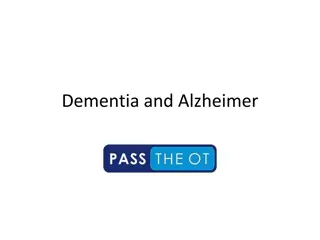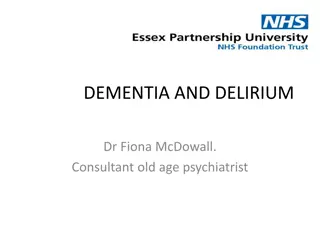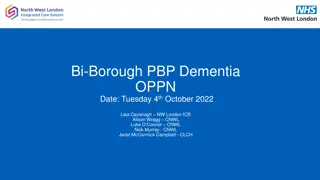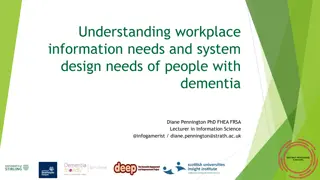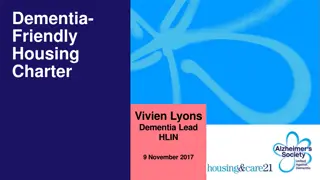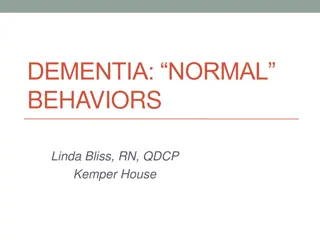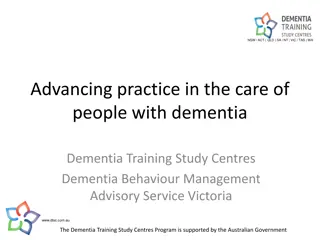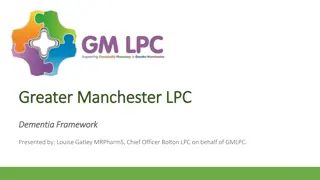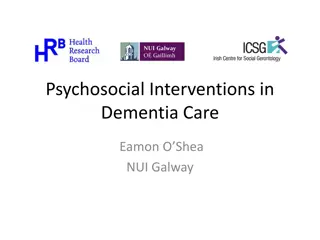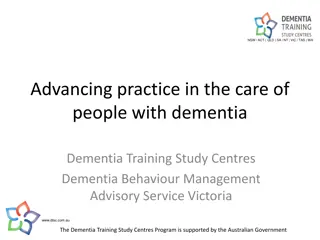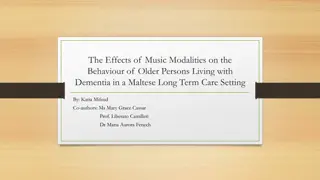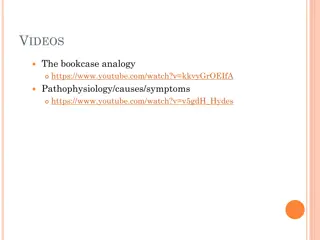Advancing Practice in the Care of People with Dementia
"Dementia Training Study Centres and Behavior Management Advisory Service in Victoria offer specialized support for individuals and families affected by dementia. Stay informed and engaged in the latest advancements in dementia care through their services."
Download Presentation

Please find below an Image/Link to download the presentation.
The content on the website is provided AS IS for your information and personal use only. It may not be sold, licensed, or shared on other websites without obtaining consent from the author.If you encounter any issues during the download, it is possible that the publisher has removed the file from their server.
You are allowed to download the files provided on this website for personal or commercial use, subject to the condition that they are used lawfully. All files are the property of their respective owners.
The content on the website is provided AS IS for your information and personal use only. It may not be sold, licensed, or shared on other websites without obtaining consent from the author.
E N D
Presentation Transcript
NSW / ACT | QLD | SA / NT | VIC / TAS | WA Advancing practice in the care of people with dementia Dementia Training Study Centres Dementia Behaviour Management Advisory Service Victoria www.dtsc.com.au The Dementia Training Study Centres Program is supported by the Australian Government
Session 4 Treatment and intervention options 2 NSW / ACT | QLD | SA / NT | VIC / TAS | WA Learning outcomes: Demonstrate knowledge relating to responses to behavioural and psychological symptoms of dementia Demonstrate knowledge relating to therapeutic interventions in a number of clinical areas www.dtsc.com.au The Dementia Training Study Centres Program is supported by the Australian Government
NSW / ACT | QLD | SA / NT | VIC / TAS | WA Care considerations Behavioural and psychological symptoms of dementia (BPSD) Falls Pain Nutrition Continence Personal care Sleep Palliation www.dtsc.com.au The Dementia Training Study Centres Program is supported by the Australian Government
NSW / ACT | QLD | SA / NT | VIC / TAS | WA Behavioural and Psychological Symptoms of Dementia (BPSD) symptoms of disturbed perception, thought content, mood, behaviour frequently occurring in persons with dementia International Psychogeriatric Association; 2002 www.dtsc.com.au The Dementia Training Study Centres Program is supported by the Australian Government
BPSD NSW / ACT | QLD | SA / NT | VIC / TAS | WA Common- affect up to 90% of people with dementia Examples include: wandering, aggression, agitation, apathy, hoarding, anxiety Increases carer burden Legal and safety issues www.dtsc.com.au The Dementia Training Study Centres Program is supported by the Australian Government
BPSD NSW / ACT | QLD | SA / NT | VIC / TAS | WA Impacts on: Functional status Prognosis Admission to residential care Care staff Hospital length of stay Language of BPSD Problem behaviours Challenging behaviours Behaviours of concern Unmet needs behaviours Needs Driven Behaviours BPSD www.dtsc.com.au The Dementia Training Study Centres Program is supported by the Australian Government
Activity NSW / ACT | QLD | SA / NT | VIC / TAS | WA Discuss the terminology surrounding BPSD in terms of its appropriateness and impact on the person, family carers and care staff. Which do you prefer and why? www.dtsc.com.au The Dementia Training Study Centres Program is supported by the Australian Government
NSW / ACT | QLD | SA / NT | VIC / TAS | WA Principles of behaviour management Psychosocial/non-pharmacological approach Identify the factors behind the behaviour change Develop individualised strategies based on assessment www.dtsc.com.au The Dementia Training Study Centres Program is supported by the Australian Government
NSW / ACT | QLD | SA / NT | VIC / TAS | WA Advantages of Non-Pharmacological Interventions in BPSD Recognises rather than masks the underlying needs being communicated by the behaviour Less limitations than pharmacological management, i.e. side effects, drug interactions Practical and relatively in-expensive Enhances carer attitudes towards care recipients with BPSD compared to pharmacological approach www.dtsc.com.au The Dementia Training Study Centres Program is supported by the Australian Government
Behaviour assessment NSW / ACT | QLD | SA / NT | VIC / TAS | WA Establish the level of risk that the behaviour presents to the person and to others; Provide a clear description of the behaviour, including the frequency, severity and triggers; Gather information about the person: their characteristics, life history, diagnosis and support needs; Gather information about the carer: characteristics, communication approach, relationship factors and stress threshold; Critically review the care environment: physical, social, cultural, emotional and spiritual; Rule out medical causes. (Dementia Behaviour Management Advisory Service) www.dtsc.com.au The Dementia Training Study Centres Program is supported by the Australian Government
Team Concept Mapping NSW / ACT | QLD | SA / NT | VIC / TAS | WA Brings assessment data together using CAUSED Model: (Aberdeen et al, 2010) www.dtsc.com.au The Dementia Training Study Centres Program is supported by the Australian Government
Team Concept Mapping steps NSW / ACT | QLD | SA / NT | VIC / TAS | WA Initiate Implement Evaluate and review care Act on outcomes www.dtsc.com.au The Dementia Training Study Centres Program is supported by the Australian Government
Pharmacological management of BPSD NSW / ACT | QLD | SA / NT | VIC / TAS | WA Second-line approach Only where behaviours cause severe distress or harm Antidepressants, analgesics, antipsychotics Target right drug to right symptom www.dtsc.com.au The Dementia Training Study Centres Program is supported by the Australian Government
BPSD that may respond to medication NSW / ACT | QLD | SA / NT | VIC / TAS | WA Anxiety Depressive symptoms Manic-like symptoms Persistent and distressing hallucinations/delusions Persistent and severe verbal and physical aggression www.dtsc.com.au The Dementia Training Study Centres Program is supported by the Australian Government
NSW / ACT | QLD | SA / NT | VIC / TAS | WA BPSD that will not respond to medication Wandering Socially inappropriate urination/ defaecation Socially inappropriate dressing/undressing Repetitive activities (perseveration) or vocalisation Hiding/hoarding Eating inedibles www.dtsc.com.au The Dementia Training Study Centres Program is supported by the Australian Government
Falls Higher risk in people with dementia Interventions centre on modification of the environment Minimising risks Reducing intrinsic factors wherever possible. NSW / ACT | QLD | SA / NT | VIC / TAS | WA Can manifest as disturbed sleep or behavioural symptoms Assessment Treatment should include non- pharmacological intervention www.dtsc.com.au The Dementia Training Study Centres Program is supported by the Australian Government
Nutrition NSW / ACT |QLD | SA / NT | VIC / TAS | WA Compromised by dementia symptoms Management of altered cognition Loss of interest in food May have extreme hunger and crave sweets Exclude other medical causes acute illness, depression Review medications as these may be affecting appetite or causing nausea Check oral health www.dtsc.com.au The Dementia Training Study Centres Program is supported by the Australian Government
Interventions NSW / ACT |QLD | SA / NT | VIC / TAS | WA Finger foods Provide healthy snacks Small frequent meals Keep fluids visible throughout the day Uncomplicated table settings Unpatterned crockery Serve one dish at a time Keep the environment calm and quiet at mealtimes www.dtsc.com.au The Dementia Training Study Centres Program is supported by the Australian Government
Continence NSW / ACT |QLD | SA / NT | VIC / TAS | WA As cognition declines, people with dementia are more susceptible to both urinary and faecal incontinence Interventions Continence assessment-usual pattern Observe for cues: agitation, fidgeting Timed toileting Prompted voiding Fluid intake Clothing Make toilet easily recognisable Decreased ability to recognise need, respond to sensation and locate toilet www.dtsc.com.au The Dementia Training Study Centres Program is supported by the Australian Government
Personal care NSW / ACT |QLD | SA / NT | VIC / TAS | WA Decreasing ability to attend to personal hygiene, grooming and dressing Resistance to care Interventions Ascertain and maintain person s usual routines and habits Be aware of personal history www.dtsc.com.au The Dementia Training Study Centres Program is supported by the Australian Government
Sleep NSW / ACT |QLD | SA / NT | VIC / TAS | WA Sleep disturbances include: Early wakening Interventions Medical assessment Night time wandering and restlessness exclude reversible causes Reversed day-night cycle management of co-existing morbidities Disorientation to time Medication review, particularly review of diuretic regimes Environmental assessment focusing on room temperature and lighting Limit caffeinated drinks Encourage exercise physical and mental www.dtsc.com.au The Dementia Training Study Centres Program is supported by the Australian Government
Palliation NSW / ACT |QLD | SA / NT | VIC / TAS | WA Dementia now being recognised as a terminal disease A palliative approach is an important clinical and social issue Optimise quality of life Limit disability Treatment of acute episodes Advance care planning www.dtsc.com.au The Dementia Training Study Centres Program is supported by the Australian Government
